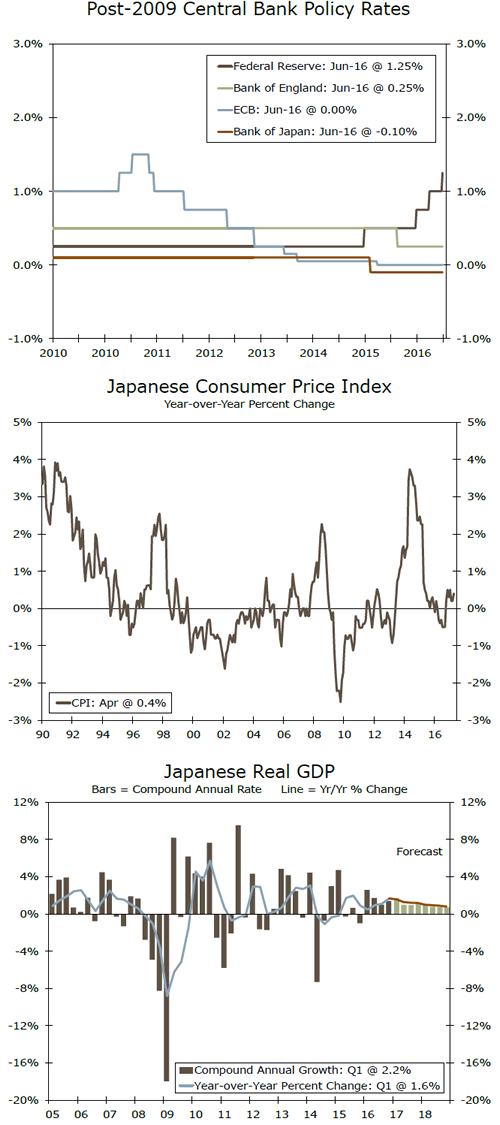In recent weeks, the message from the major central banks has been – get ready for a return to more normal policy. The Bank of Japan is prioritizing its inflation target even at the risk of being too accommodative.
Bucking the Trend
This week has been broadly consequential in terms of major central bank meetings. The Fed raised rates for the second time this year and offered some specifics on how it would begin winding down its balance sheet. The Bank of England (BoE) held rates steady but only by a 5-3 vote. The fastest pace of inflation since 2013 in the United Kingdom has some policymakers thinking the time is right for the BoE to join the Fed in raising rates. Finally, the European Central Bank (ECB) in its meeting last week dropped a reference to a future rate cut, and markets are expecting a communication later this year about a tapering of the ECB’s asset purchase program.
That was the backdrop leading into this week’s meeting of the Bank of Japan (BoJ). While other major central banks are moving to normalize policy, the BoJ is steadfast in its commitment to achieving what has been a fleeting objective for a generation: sustained CPI inflation of 2.0 percent.
For the sixth consecutive meeting, policymakers in Tokyo made no change to the broad set of stimulative monetary policies that it has labeled "Quantitative and Qualitative Monetary Easing (QQE) with Yield Curve Control."
In specific terms that means it will maintain: (1) a negative policy rate of -0.10 percent, (2) a pace of Japanese Government Bond (JGB) purchases sufficient to keep the yield on the 10-year JGB "around zero percent" at an annual pace of roughly ¥80 trillion yen, (3) purchases of exchange-traded mutual funds at an annual pace of ¥6 trillion, (4) purchases of real estate investment trusts at an annual pace of ¥90 billion and (5) commercial paper and corporate bond holdings at their present values of ¥2.2 trillion and ¥3.2 trillion, respectively.
In a press conference following the meeting, Governor Kuroda articulated the Bank’s position on the growing pressure to join in the normalization trend among other central banks. "Achieving and maintaining stable prices and avoiding a return to deflation are far more important than the problems of the prolonged period of easing."
Effectiveness and Growth Outlook
Kuroda is now in the last year of his five-year term. The avant-garde approach to monetary policy during his governorship has had mixed results. The BoJ has been successful in arresting what had been a four-year pattern of deflation when he took over. However, achieving the price stability target of 2.0 percent has been an elusive goal.
Arguably, the accommodative policy is helping with growth. If Japanese GDP growth is positive in the current quarter, as we expect it will be, it will extend the streak of consecutive quarters of GDP growth to five – a feat not matched at any point in the current expansion.

